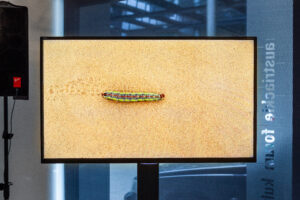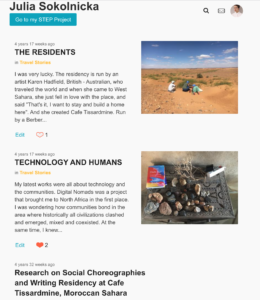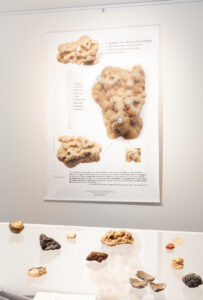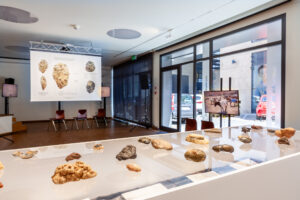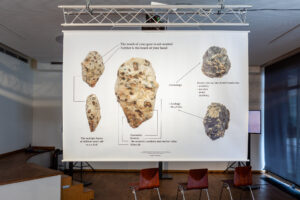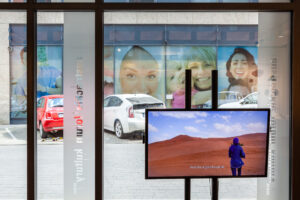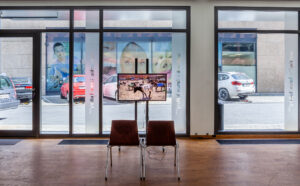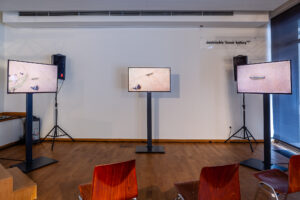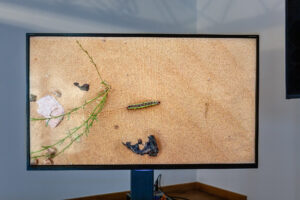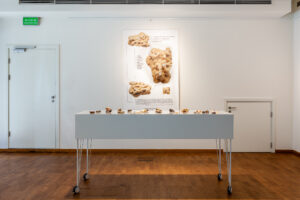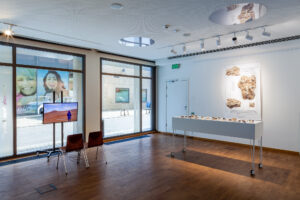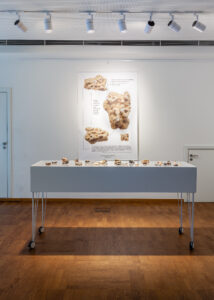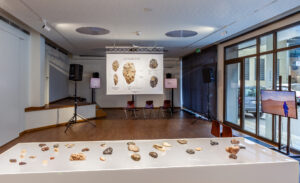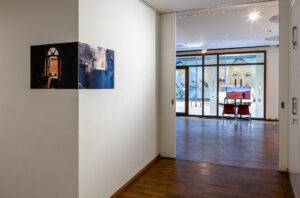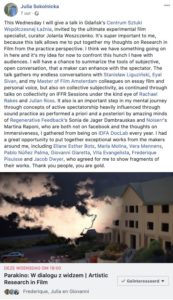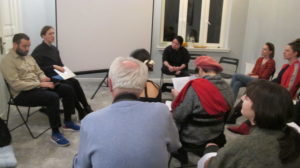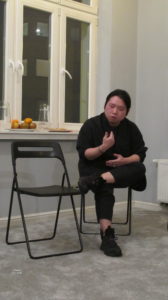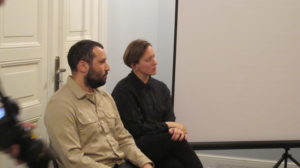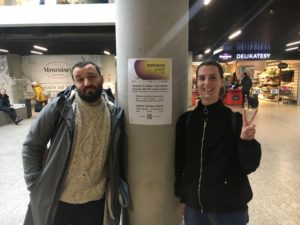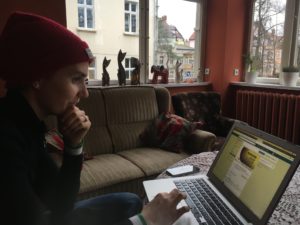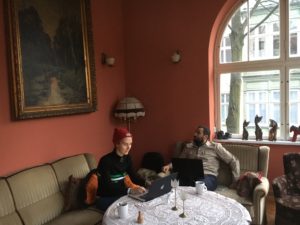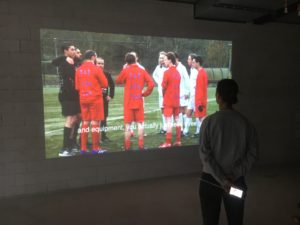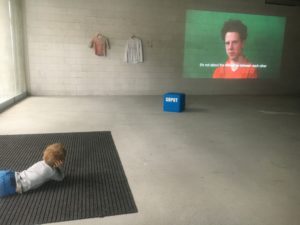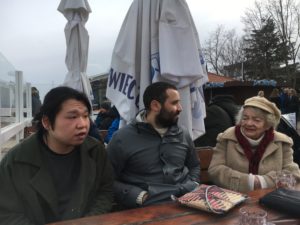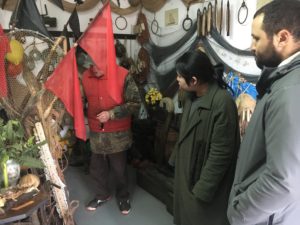Julia Sokolnicka
Blog Photography Film
Posts Tagged ‘artisticresearch’
Pustynia/ Wüste exhibition at Austrian Cultural Forum Warsaw as an outcome of Saharan Residency
poniedziałek, 9 maja, 2022
In March 2019 I went to a residency Cafe Tissardmine in Western Sahara in Morocco. The residency is run by an artist and cultural manager Karen Hadfield and it’s a real treasure.
Cafe Tissardmine
My participation in the residency was supported by European Cultural Foundation Step Travel grant and you can read about it more on their website:
https://ecflabs.org/julia.sokolnicka.1547993193
It is at this residency where I met Andrea Peregrini, an Austrian sound artist based in Zwettle area in Austria, where most beautiful plateau with old huge stones is. Andrea is a sound artist connected to Vienna sound art and artistic research scene.
During my stay in Morocco I was primarily interested in reading and researching more about decolonial social choreographies and thinking of social behaviors outside of the cultural heritage coding.
But once arrived it was clear to me, that much more interesting are the non human subject and the experience of being in the desert and endless wandering. The very focus on the human subjects seemed out of place even, as I was questioning what right do I have to film and engage in documentation of situations, which I am not a part of, and how it makes these observations turn into questionable ethnology.
I began to film everything, and trying to be more attentive towards how I felt about the filming itself. I was walking and filming, sometimes having my camera put away and sometimes pointed at random things, but mostly stones. Andrea was aiming to record as well – but her tools were directed at sounds. Together with another artist who was staying at the time in Tissardmine- Carina Cheung, we made trips and explorations, mostly collecting stones in large quantities.
I returned to Amsterdam with a handfull of video material and a bag full of stones and I dived into other projects. Only in 2021 I was approached by Stanisław Welbel who is a Warsaw based curator, who offered me a collaboration. According to the programming of the Austrian Cultural Forum, which he works for, the invitation extends to a collaborating artist who must be based in Austria. I immediately thought of Andrea and her recordings and to my great joy she accepted the invitation.
In the early 2022 I found myself visiting her home in Zwettle and working together on a quadrophonic audiovisual installation composed from our materials.
In April 2022 we already had an exhibition, wonderfully curated by Stanisław Welbel, who encouraged us also to show objects.
https://austria.org.pl/wydarzenia/pustynia-wuste-julia-sokolnicka-andrea-peregrini
Description from the website of the Austrian Cultural Forum
The exhibition is the result of cooperation between Julia Sokolnicka (PL) and Andrea Peregrini (AT), who met in 2019 during the Café Tissardmine artist residency in Morocco, near Erfoud (Western Sahara). The residence is located in traditional buildings near an Amazyg (Berber) village and is run by Australian-English cultural producer Karen Hadfield. Car rallies, film crews and ordinary tourists often take place in the area. The local community is also engaged in traditional crafts and date cultivation.
The artists use different media, Andrea deals with sound and Julia deals with film. During the residency, they not only recorded field recordings and films, but above all, they reflected on the possibilities and limitations that lay ahead of them as artists and visitors who appeared in this place for a short time. In this way, their work became a reflection on the position and role of the tourist, ways of perception and issues related to the control provided by the power to look through the camera lens or listen and record with a microphone in the context of interpersonal and interspecies relations. In the background of their joint work there are questions about the ethical side of creating art as part of artistic residency programs, especially in the postcolonial context.
Exhibition:
Desert / Wüste. Julia Sokolnicka, Andrea Peregrini
Artists/Künstlerinnen: Julia Sokolnicka (PL), Andrea Peregrini (AT)
Curator: Stanisław Welbel
Vernissage and meeting with artists 22/04/2022 (Friday) 18:00
Introduction and moderation of the meeting – Dr. Dorota Łagodzka
Dr. Dorota Łagodzka – art historian, cultural expert, assistant professor at the Faculty of Artes Liberales, University of Warsaw, co-author and coordinator of the anthropozoology course. Author of numerous publications in the field of cultural animal studies and contemporary art.
Concert accompanying the exhibition – April 25, 2022 (Mon) 7:00 p.m
Andrea Peregrini – Electronics https://soundcloud.com/unstable_range/erosion
Piotr Dąbrowski – Percussion instruments https://soundcloud.com/piotr-d-browski-2
Piotr Dąbrowski – sound practitioner, percussionist, musician following his own path, drawing learning and inspiration from everywhere. For him, musical practice is a spiritual – life practice – the Way of Sound.
In Polish:
https://austria.org.pl/wydarzenia/pustynia-wuste-julia-sokolnicka-andrea-peregrini
Wystawa jest rezultatem współpracy pomiędzy Julią Sokolnicką (PL) a Andreą Peregrini (AT), które spotkały się w 2019 roku podczas rezydencji artystycznej Café Tissardmine w Maroku, w pobliżu Erfoud (Sahara Zachodnia). Rezydencja mieści się w tradycyjnych zabudowaniach w pobliżu wioski Amazygów (Berberów), prowadzi ją australijsko-angielska producentka kulturalna Karen Hadfield. W okolicy często odbywają się samochodowe rajdy, pojawiają się ekipy filmowe i zwykli turyści. Lokalna społeczność zajmuje się również tradycyjnym rzemiosłem i uprawą daktyli.
Artystki posługują się różnymi mediami, Andrea zajmuje się dźwiękiem a Julia filmem. Podczas rezydencji nie tylko rejestrowały nagrania terenowe i filmowały, ale przede wszystkim zastanawiały się nad możliwościami i ograniczeniami, jakie przed nimi stały, jako artystkami oraz przybyszkami, pojawiającymi się przecież w tym miejscu przez krótki czas. W ten sposób ich praca stała się refleksją na temat pozycji i roli turysty, sposobów percepcji oraz kwestii związanych z kontrolą jaką daje władza spojrzenia przez obiektyw kamery albo słuchania i rejestrowania mikrofonem w kontekście relacji międzyludzkich i międzygatunkowych. W tle ich wspólnej pracy stoją pytania dotyczące etycznej strony powstawania sztuki w ramach programów rezydencji artystycznych, szczególnie w kontekście postkolonialnym.
Wystawa:
Pustynia / Wüste. Julia Sokolnicka, Andrea Peregrini
Artystki/Künstlerinnen: Julia Sokolnicka (PL), Andrea Peregrini (AT)
Kurator: Stanisław Welbel
Wernisaż i spotkanie z artystkami 22.04.2022 (pt.) 18:00
Wprowadzenie i moderacja spotkania – dr Dorota Łagodzka
dr Dorota Łagodzka – historyczka sztuki, kulturoznawczyni, adiunkta na Wydziale Artes Liberales UW, współautorka i koordynatorka kierunku antropozoologia. Autorka licznych publikacji z zakresu kulturowych studiów nad zwierzętami i sztuki współczesnej.
Koncert towarzyszący wystawie – 25.04.2022 (pon.) 19:00
Andrea Peregrini – Elektronika https://soundcloud.com/unstable_range/erosion
Piotr Dąbrowski – Instrumenty perkusyjne https://soundcloud.com/piotr-d-browski-2
Piotr Dąbrowski – praktyk dźwiękowy, perkusjonista, muzyk podążający własnądrogą, czerpiący naukę i inspirację zewsząd. Praktyka muzyczna jest dla niego praktyką duchową – życiową – Drogą Dźwięku.
Wystawa do 29.05.2022
Austriackie Forum Kultury
ul. Próżna 7/9
desert_tekst_kuratorski_PL-DE-EN
Tags: AndreaPeregrini, artisticresearch, austrianculturalforum, cafetisserdmine, Julia Sokolnicka, juliasokolnicka, morocco, nonhumanpresence, Pustynia, recording, research, Stanislawwelbel, Thegoodtourist, Tourism, westsahara, wind, Wuste
Posted in blog | Możliwość komentowania Pustynia/ Wüste exhibition at Austrian Cultural Forum Warsaw as an outcome of Saharan Residency została wyłączona
W Dialogu z Widzem – In Dialogue with the Spectator in CSW Łaźnia in Gdańsk
wtorek, 3 marca, 2020
I’m giving a talk in Gdańsk’s Centrum Sztuki Współczesnej Łaźnia, invited by the ultimate experimental film specialist, curator Jolanta Woszczenko. It’s super important to me, because this talk allows me to put together my thoughts on Research in Film from the practice perspective. I think we have something going on in here and it’s my idea for now to confront this hunch I have with audiences. I will have a chance to summarize the tools of subjective, open conversation, that a maker can enhance with the spectator. The talk gathers my endless conversations with Stanisław Liguziński, Eyal Sivan, and my Master of Film Amsterdam colleagues on essay film and personal voice, but also on collective subjectivity, as continued through talks on collectivity on IFFR Sessions under the kind eye of Rachael Rakes and Julian Ross. It also is an important step in my mental journey through concepts of active spectatorship heavily influenced through sound practice as performed a priori and a posteriori by amazing minds of Regenerative Feedback’s Sonia de Jager Dambrauskas and Noiserr’s Martina Raponi, who are both not on facebook and the thoughts on immersiveness, I gathered from being on IDFA DocLab every year. I had a great opportunity to put together exceptional works from the makers around me, including Eliane Esther Bots, María Molina, Vera Mennens, Pablo Núñez Palma, Giovanni Giaretta, Vita Evangelista, Frederique Pisuisse and Jacob Dwyer, who agreed for me to show fragments of their works. Thank you people, you are gold.
https://www.facebook.com/events/2962027950507918/
pictured – a fragment of „Tripsitter” By Frederique Pisuisse
PARAKINO: Artistic Research in Film
Venue: 4 march at 6.00 p.m.
Place: LAZNIA CCA 1 DOLNE MIASTO
Curator of the Parakino cycle: Jolanta Woszczenko
Curator of March screening: Julia Sokolnicka
This program will be dedicated to films developed through Artistic Reserach in Film and to the notion of the Artistic Research itself. We will look at works from the point of view of the practice – focusing less on the final work of art, and more at the process.
We will screen fragments of works that emphasize the film as storytelling (Artistic research in Cinema as opposed to Video Art) and focus on the means of narrative, instead of aesthetics. During the presentation, Julia Sokolnicka will show fragments of works by audiovisual artists identified as experimental filmmakers, whose methodologies are shaped within the knowledge and production schemes of the art institutions in the Netherlands. We will also discuss the fresh findings of the Rotterdam International Film Festival, that showcases new perspectives and short artistic films.
The lecture- screning will feature artists who engage in art-making as knowledge production, including fragments of the works of Frederique Pissuise, Jacob Dwyer, Vita Evangelista, Giovanni Giaretta, Eliane Boots, Pablo Núñez Palma, Maria Molina or Vera Mennes – artists connected to the Dutch Film Academy, Lima platform, Sandberg Instituut, De Ateliers and Rijksakademie.
With the help of visual material, Julia will attempt to categorize the tools of cinematic storytelling, that define the author’s relationship with the viewer understood as a partner. Those include Voice Over, use of New Media and editing, that helps audiance to build a relationship with the story and the author. As well as means that serve intimacy of storytelling – a specific use of sound, simplicity of form, performative elements
In the context of Artistic Research, and within an assumption of conscious work in the process, the significance of individual author- a star artist- shifts to the context of collective subjectivity. A conscious and receptive viewer becomes a partner and sometimes a co-creator of the work.
—
Julia Sokolnicka is the founder and member of the Reseracher Office – agency of artistic services, creating narratives with, and for Institutions and Archives. She created „Hearth”- a series of meetings around artistic reserach in film, at DeAppel gallery in Amsterdam. During the meeting in Łaźnia, she will also share her work experiences and research projects (including Het Nieuwe Instituut, Vertical Atlas curated by Benjamin Bratton) and examples of vertical narratives. Her programming and public relations work has recently focused on shifting attention to collectivization as a potentially sustainable model of working in arts.
Sokolnicka was a member of this year’s IFFR Sessions at the Rotterdam Film Festival, which gathered a group of authors, curators, critics and artists, discussing the conditions of collectivity as a new model of film production. IFFR Sessions aimed to recognize models of collective participation in the intersection of the art market and film market. In her artistic work and social activities, she is interested in the idea of negotiation and confrontation, as well as tools of protocol or manual and the ideas of Good Behavior, Common Rule or emotional education. Julia is a co-founder of the Professional Standards Regulation Network For Artists.
Tags: artisticresearch, experimentalfilm, frederiquepissuise, jolantawoszczenko
Posted in blog | Możliwość komentowania W Dialogu z Widzem – In Dialogue with the Spectator in CSW Łaźnia in Gdańsk została wyłączona
Non-violent revolutions with Wael el Allouche in Sopot
poniedziałek, 2 marca, 2020
During their stay in Sopot – focusing on their existing projects exploring social dependencies, public space movement and non-political social movements – Julia and Wael want to create a leaven for their first joint work in the area of social art. Sopot will become their social observation laboratory, and during each day, as part of an exhibition open to the public, they will meet with residents, showcase selected video works and explore the themes of informal revolutionary movements existing since the 1950s in Sopot.
Coordinator and curator of Inne Rytmy: nonviolent revolutions – Weronika Morawiec.
INNE RYTMY: nonviolent revolutions schedule of events:
20.02.2020 Thursday: official opening of the exhibition in Sopot Centrum at 18:30 (1st floor, opposite Sopot), the projections will be available from 20-22 February.
21.02.2020 Friday: meeting and discussion at the Goyki3 Art Inkubator 18:30
Performer Yuki Nishimura, Bogna Hall doctor of political science and cultural studies and dancer and performer Anna Steller will join the panel discussion
https://www.facebook.com/events/214953766342066/
The arrival and stay of artists Wael el Allouche and Julia Sokolnicka is possible thanks to the financial support of Stimuleringsfonds NL. Yuki Nishimura is supported by EU・ジャパンフェスト日本委員会 comitee.
Partners of the event: Goyki3 Art Incubator, Sopot Centrum, Non Iron Group, noks collective & City of Sopot
Here some pictures from the meeting:
Tags: art, artisticresearch, goyki3, juliasokolnicka, muzeumsopot, research, residency, socialart, sopot, sopotcentrum, sopoteka, sopotmuzeum, stimuleringsfonds, waelallouche, weronikamorawiec, yukinishimura
Posted in blog | Możliwość komentowania Non-violent revolutions with Wael el Allouche in Sopot została wyłączona
